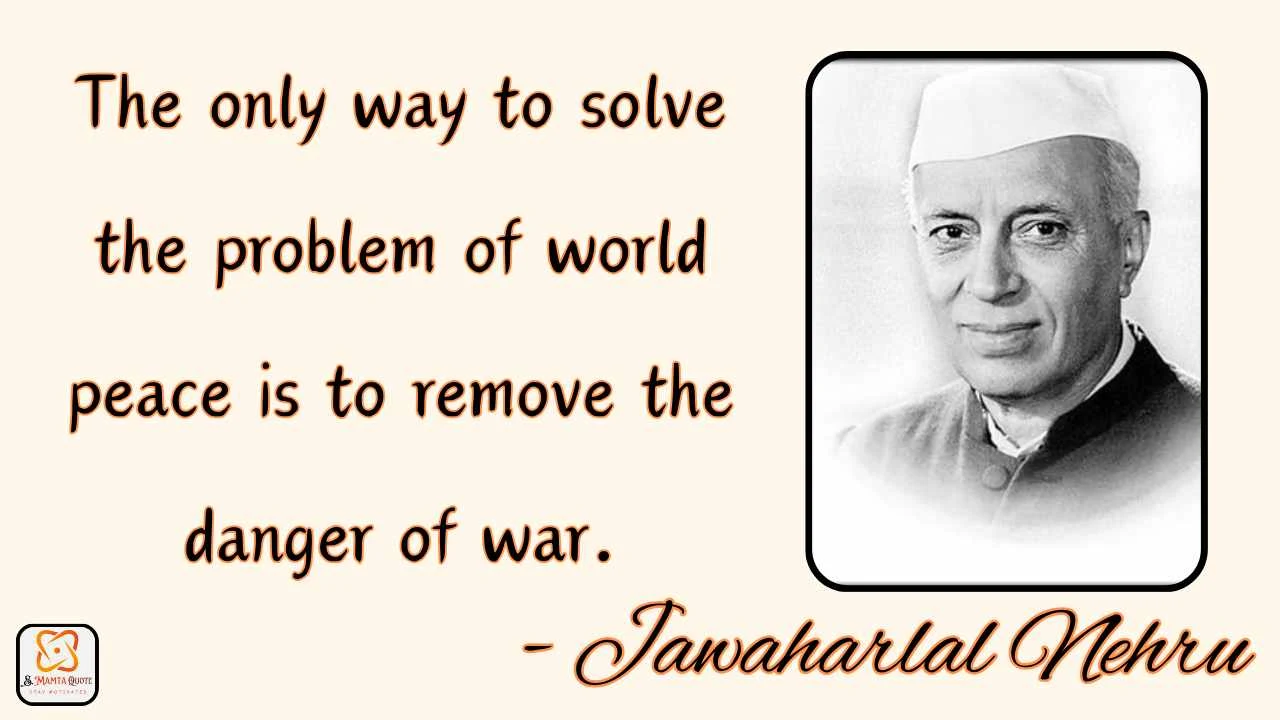
Top 20 Quotes From Jawaharlal Nehru
Welcome to a world illuminated by the brilliance of Jawaharlal Nehru's thoughts – a world where inspiration knows no bounds, and possibilities are limitless.
Jawaharlal Nehru
, the visionary leader and the first Prime Minister of independent India, left behind a legacy that transcends time. His words, imbued with wisdom and insight, continue to resonate with people across generations, inspiring and motivating them to strive for a better world. In this curated collection, we present the top 20 quotes from Jawaharlal Nehru, meticulously selected to encapsulate his profound thoughts on life, leadership, and the human spirit.
As we navigate the complexities of the modern world, Nehru's quotes serve as beacons of light, guiding us through the darkness of uncertainty and doubt. From timeless principles of courage and resilience to poignant reflections on the essence of peace and progress, Nehru's words offer invaluable lessons for individuals seeking inspiration and guidance in their personal and professional journeys.
In this top quotes collection, you will discover Nehru's unparalleled ability to distill profound truths into succinct and impactful statements. Whether you're seeking motivational quotes to fuel your ambitions, inspirational insights to uplift your spirits, or timeless wisdom to navigate life's challenges, Nehru's quotes provide a rich tapestry of guidance and encouragement.
Moreover, Nehru's quotes hold particular significance for the young generations, serving as catalysts for personal growth, social change, and nation-building. His unwavering belief in the power of youth as agents of progress echoes through his words, igniting a spark of inspiration in the hearts of young minds worldwide.
From his reflections on the importance of education and knowledge to his advocacy for social justice and equality, Nehru's quotes transcend mere words, embodying the ideals of a life well-lived and a world transformed. As we delve into Nehru's thoughts, we embark on a journey of self-discovery and enlightenment, embracing the timeless wisdom of a leader who shaped the course of history.
Join us as we explore Nehru's top quotes, each offering a glimpse into the profound depths of his intellect and the enduring legacy of his vision.
Let his words inspire, motivate, and empower you to embrace life's challenges with courage, compassion, and conviction.

The policy of being too cautious is the greatest risk of all.
- Jawaharlal Nehru
Explanation:
Nehru emphasizes the importance of boldness and decisiveness in leadership. He suggests that being overly cautious can hinder progress and innovation.

A moment comes, which comes but rarely in history, when we step out from the old to the new, when an age ends, and when the soul of a nation, long suppressed, finds utterance.
- Jawaharlal Nehru
Explanation:
Nehru reflects on the transformative power of historical moments, where nations undergo profound changes and find their voices after periods of suppression or stagnation.

The only alternative to coexistence is co-destruction.
- Jawaharlal Nehru
Explanation:
Nehru advocates for peaceful coexistence as the only viable option in a world where conflicts and tensions exist. He warns against the destructive consequences of failing to live in harmony with others.

Time is not measured by the passing of years but by what one does, what one feels, and what one achieves.
- Jawaharlal Nehru
Explanation:
Nehru highlights the importance of personal growth, accomplishments, and experiences over mere passage of time. He suggests that true fulfillment comes from one's actions and contributions.

Facts are facts and will not disappear on account of your likes.
- Jawaharlal Nehru
Explanation:
Nehru emphasizes the importance of facing reality and dealing with facts, even if they are inconvenient or uncomfortable. He discourages denial or wishful thinking in the pursuit of truth.

Loyal and efficient work in a great cause, even though it may not be immediately recognized, ultimately bears fruit.
- Jawaharlal Nehru
Explanation:
Nehru underscores the value of dedication and perseverance in serving a noble cause. He believes that sincere efforts, even if initially unnoticed, will yield positive results in the long run.

The person who runs away exposes himself to that very danger more than a person who sits quietly.
- Jawaharlal Nehru
Explanation:
Nehru encourages courage and facing challenges head-on rather than avoiding them. He suggests that running away from problems only amplifies the risks and consequences.

Action to be effective must be directed to clearly conceived ends.
- Jawaharlal Nehru
Explanation:
Nehru emphasizes the importance of having clear objectives and goals when taking action. He suggests that purposeful action is more likely to achieve meaningful results.

Ignorance is always afraid of change.
- Jawaharlal Nehru
Explanation:
Nehru observes that fear of the unknown often stems from ignorance. He suggests that those who lack understanding or knowledge are more resistant to change.

Evil unchecked grows, evil tolerated poisons the whole system.
- Jawaharlal Nehru
Explanation:
Nehru warns against the dangers of allowing evil to persist without challenge. He suggests that tolerating wrongdoing has corrosive effects on society as a whole.

Life is like a game of cards. The hand that is dealt you represents determinism; the way you play it is free will.
- Jawaharlal Nehru
Explanation:
Nehru uses a metaphor to illustrate the interplay between fate and personal agency in life. He suggests that while individuals cannot control their circumstances, they have the freedom to make choices and shape their destinies.

Without peace, all other dreams vanish and are reduced to ashes.
- Jawaharlal Nehru
Explanation:
Nehru emphasizes the foundational importance of peace for realizing any aspirations or ambitions. He suggests that conflict and instability undermine all other pursuits.

Culture is the widening of the mind and of the spirit.
- Jawaharlal Nehru
Explanation:
Nehru defines culture not merely as a set of traditions or practices but as a process of intellectual and spiritual enrichment. He sees it as essential for personal and societal growth.

The only way to solve the problem of world peace is to remove the danger of war.
- Jawaharlal Nehru
Explanation:
Nehru advocates for addressing the root causes of conflict rather than merely managing its symptoms. He believes that eliminating the threat of war is necessary for achieving lasting peace.

To be in good moral condition requires at least as much training as to be in good physical condition.
- Jawaharlal Nehru
Explanation:
Nehru equates moral development with physical fitness, suggesting that cultivating virtues and ethical behavior requires deliberate effort and discipline.

Success often comes to those who dare and act. It seldom goes to the timid who are ever afraid of the consequences.
- Jawaharlal Nehru
Explanation:
Nehru highlights the correlation between boldness and success, suggesting that those who take risks and take action are more likely to achieve their goals than those who hesitate.

The art of a people is a true mirror to their minds.
- Jawaharlal Nehru
Explanation:
Nehru suggests that the cultural expressions of a society reflect its collective psyche and values. He sees art as a window into the soul of a people.

You can tell the condition of a nation by looking at the status of its women.
- Jawaharlal Nehru
Explanation:
Nehru underscores the importance of gender equality and women's empowerment in assessing the progress and development of a society.

Time is short, and the task is great. Let us work, with courage and confidence, to build a better world.
- Jawaharlal Nehru
Explanation:
Nehru emphasizes the urgency of addressing the world's challenges while expressing optimism and determination in the face of adversity.

To be successful in the world, it is much more necessary to possess the penetration to discern who is a fool, than to discover who is a clever man.
- Jawaharlal Nehru
Explanation:
Nehru emphasizes the importance of discernment and judgment in navigating the complexities of the world. He suggests that understanding the nature of people is essential for success.
Jawaharlal Nehru's legacy as a visionary leader, prolific writer, and influential figure in Indian history is beautifully encapsulated in his timeless words. The compilation of his top 20 quotes serves as a testament to his wisdom, foresight, and commitment to progress. From advocating for peace and unity to championing the empowerment of women and the marginalized, Nehru's quotes resonate across generations and continue to inspire millions around the world.
This top quotes collection from Jawaharlal Nehru not only offers valuable insights into leadership, courage, and perseverance but also serves as a treasure trove of motivational and inspirational gems. Nehru's thoughts transcend time and space, offering guidance and encouragement to individuals striving to make a positive impact in their lives and communities.
As we reflect on Nehru's enduring legacy, it becomes evident that his words possess the power to ignite passion, instill hope, and inspire action. They remind us of the importance of standing up for what is right, embracing diversity, and working towards a brighter future for all.
In a world filled with challenges and uncertainties, Nehru's quotes serve as beacons of light, guiding us through the darkness and inspiring us to persevere in the face of adversity. They remind us that greatness lies within each of us and that we have the ability to shape our destinies and inspire change.
As we strive to navigate life's complexities and overcome obstacles, let us draw strength from Nehru's timeless wisdom and let his words inspire us to lead with compassion, courage, and conviction.
Thank You





















.png)

.png)





.webp)






.webp)
.webp)